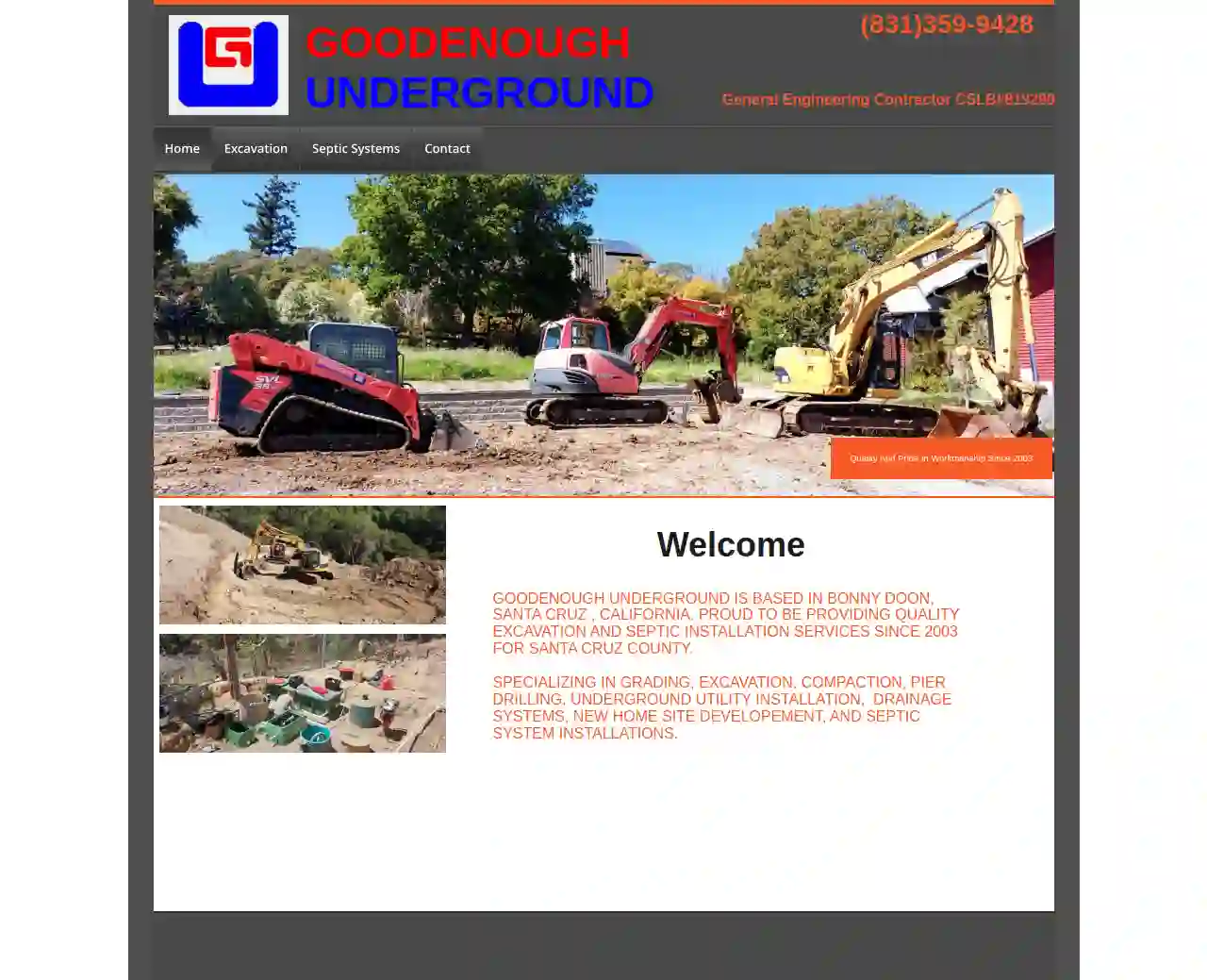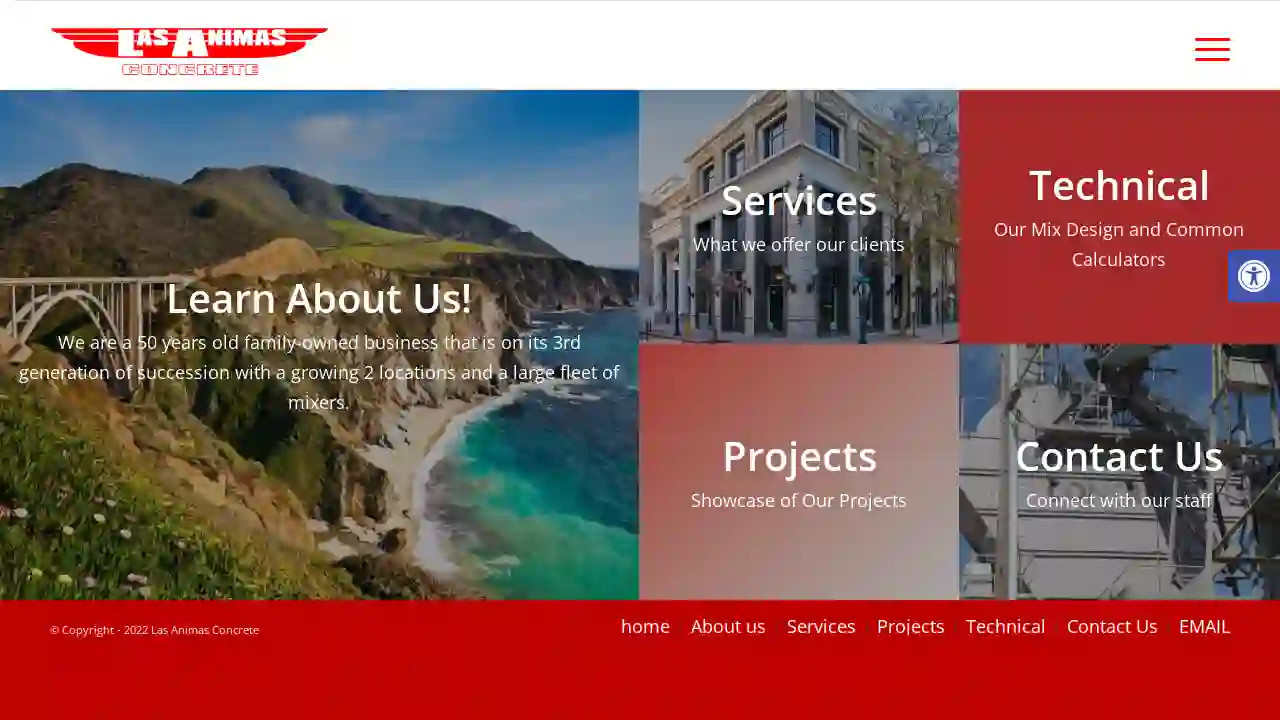Dirt Contractors Santa Cruz
Top 10 Dirt Contractors in Santa Cruz
Get 3 FREE Dirt Contractors quotes for your project today! Compare profiles, reviews, accreditations, portfolio, etc... and choose the best service.
Service Needed
City or Town

Freedom Earthworks
514 reviewsSanta Cruz, US- Services
- Why Us?
Get Quote
GOODENOUGH UNDERGROUND INC.
57 reviewsBonny Doon, USGOODENOUGH UNDERGROUND IS BASED IN BONNY DOON, SANTA CRUZ , CALIFORNIA. PROUD TO BE PROVIDING QUALITY EXCAVATION AND SEPTIC INSTALLATION SERVICES SINCE 2003 FOR SANTA CRUZ COUNTY. SPECIALIZING IN GRADING, EXCAVATION, COMPACTION, PIER DRILLING, UNDERGROUND UTILITY INSTALLATION, DRAINAGE SYSTEMS, NEW HOME SITE DEVELOPEMENT, AND SEPTIC SYSTEM INSTALLATIONS.
- Services
- Why Us?
- Our Team
- Gallery
Get Quote
Las Animas Concrete Santa Cruz
4.710 reviewsSanta Cruz, US- Services
- Why Us?
Get Quote
Over 3,943+ Excavation Contractors onboarded
Our excavation pros operate in Santa Cruz & beyond!
ExcavationHQ has curated and vetted Top Excavation Companies near Santa Cruz. Find a trustworthy business today.
Frequently Asked Questions About Dirt Contractors
Have questions about dirt contractors and their services? We've compiled answers to frequently asked questions to help you understand the process and make informed decisions for your dirt-related projects in the USA.
- Large-Scale Excavation: Assessing soil conditions, designing slopes, and ensuring stability for large excavation projects.
- Foundation Design: Determining the appropriate foundation type and depth based on soil bearing capacity and other factors.
- Retaining Walls: Designing retaining walls to stabilize slopes, prevent erosion, or create level areas on sloped sites.
- Slope Stability Analysis: Evaluating the stability of slopes and recommending measures to prevent landslides or erosion.
- Contaminated Soil Remediation: Developing and implementing plans to clean up contaminated soil.
- Erosion Control: Berms can intercept and slow down runoff, preventing soil erosion and sedimentation.
- Noise Reduction: Berms can act as noise barriers, reducing noise pollution from traffic, construction, or industrial activities.
- Visual Screening: Berms can block unsightly views, create privacy, or define property boundaries.
- Security: Berms can serve as security barriers, deterring unauthorized access or vehicle intrusion.
- Landscaping: Berms can enhance landscaping by creating elevation changes, providing planting areas, or defining garden beds.
- Clearly Define Your Project Scope: Provide the contractor with detailed information about your project, including the size of the area, the type and volume of dirt needed, the desired grading or leveling, and any specific requirements.
- Obtain Multiple Quotes: Request quotes from multiple reputable dirt contractors to compare prices, services, and experience. Ensure the quotes are comprehensive and include all project details.
- Verify Licensing and Insurance: Confirm that the contractor has the necessary licenses, insurance coverage, and a good safety record. This protects you from potential liabilities.
- Communicate Openly and Regularly: Maintain open communication with the contractor throughout the project, addressing any questions, concerns, or changes promptly. Regular updates and site visits can help ensure everything is on track.
- Document Everything: Keep written records of all communication, contracts, quotes, and invoices for reference and accountability.
- Designated Disposal Facilities: Contact your local waste management authority or search online for designated dirt and debris disposal facilities in your area. They accept various types of soil and construction materials.
- Recycling Centers: Some recycling centers accept clean fill dirt, concrete, or brick for reuse in other construction projects.
- Donation: If the dirt is clean and suitable for gardening or landscaping, consider donating it to community gardens, schools, or neighbors with landscaping projects.
What is a soil engineer, and when might I need one?
A soil engineer is a professional specializing in the analysis, design, and construction of earthworks and foundations. Their expertise is often required for projects involving:
What is a dirt berm, and what are its uses?
A dirt berm is a raised mound or embankment constructed from soil or other materials. It serves various purposes, including:
What are some tips for working with dirt contractors?
Effective communication and collaboration with dirt contractors are key to a successful project. Here are some helpful tips:
What is the best way to dispose of excess dirt?
Disposing of excess dirt responsibly is essential for environmental protection and compliance with regulations. Options include:
What is a soil engineer, and when might I need one?
A soil engineer is a professional specializing in the analysis, design, and construction of earthworks and foundations. Their expertise is often required for projects involving:
- Large-Scale Excavation: Assessing soil conditions, designing slopes, and ensuring stability for large excavation projects.
- Foundation Design: Determining the appropriate foundation type and depth based on soil bearing capacity and other factors.
- Retaining Walls: Designing retaining walls to stabilize slopes, prevent erosion, or create level areas on sloped sites.
- Slope Stability Analysis: Evaluating the stability of slopes and recommending measures to prevent landslides or erosion.
- Contaminated Soil Remediation: Developing and implementing plans to clean up contaminated soil.
What is a dirt berm, and what are its uses?
A dirt berm is a raised mound or embankment constructed from soil or other materials. It serves various purposes, including:
- Erosion Control: Berms can intercept and slow down runoff, preventing soil erosion and sedimentation.
- Noise Reduction: Berms can act as noise barriers, reducing noise pollution from traffic, construction, or industrial activities.
- Visual Screening: Berms can block unsightly views, create privacy, or define property boundaries.
- Security: Berms can serve as security barriers, deterring unauthorized access or vehicle intrusion.
- Landscaping: Berms can enhance landscaping by creating elevation changes, providing planting areas, or defining garden beds.
What are some tips for working with dirt contractors?
Effective communication and collaboration with dirt contractors are key to a successful project. Here are some helpful tips:
- Clearly Define Your Project Scope: Provide the contractor with detailed information about your project, including the size of the area, the type and volume of dirt needed, the desired grading or leveling, and any specific requirements.
- Obtain Multiple Quotes: Request quotes from multiple reputable dirt contractors to compare prices, services, and experience. Ensure the quotes are comprehensive and include all project details.
- Verify Licensing and Insurance: Confirm that the contractor has the necessary licenses, insurance coverage, and a good safety record. This protects you from potential liabilities.
- Communicate Openly and Regularly: Maintain open communication with the contractor throughout the project, addressing any questions, concerns, or changes promptly. Regular updates and site visits can help ensure everything is on track.
- Document Everything: Keep written records of all communication, contracts, quotes, and invoices for reference and accountability.
What is the best way to dispose of excess dirt?
Disposing of excess dirt responsibly is essential for environmental protection and compliance with regulations. Options include:
- Designated Disposal Facilities: Contact your local waste management authority or search online for designated dirt and debris disposal facilities in your area. They accept various types of soil and construction materials.
- Recycling Centers: Some recycling centers accept clean fill dirt, concrete, or brick for reuse in other construction projects.
- Donation: If the dirt is clean and suitable for gardening or landscaping, consider donating it to community gardens, schools, or neighbors with landscaping projects.